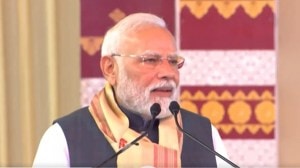The deep rot in all spheres of governance
Measures to curb corruptionThe measures for reducing political corruption in India will need to consist of the following elements. These nee...

Measures to curb corruption
The measures for reducing political corruption in India will need to consist of the following elements. These need to be emphasised in a summary manner even at the risk of repetition:
• Total freedom to individuals and corporate bodies to contribute to political parties without any upper limit, and the availability of benefits of tax deduction under the Income Tax Act.
• A candidate against whom a chargesheet has been framed in the court in any criminal case involving moral turpitude should not be permitted to contest elections.
• The Explanation 1 below Section 77 of the Representation of People’s Act should be deleted.
• No political party should be permitted to contest elections unless their accounts are audited.
• No candidate should be permitted unless he has got Income Tax clearance certificate.
• Allegations of corrupt practices must be enquired into urgently by the Election Commission without waiting for elections to be held.
• Nexus between corrupt elements in politics and bureaucracy should be nipped in the bud by a system by which all posts will be filled up by a process of appointment based on panels recommended by neutral and objective committees. Once appointments are made, a person should not be transferred from the post for two to three years.
• Corrupt Public Servants (Forefeiture of Property) Act should be brought into force immediately for implementation.
• Benami Transaction Prohibition Act of 1988 should be implemented effectively. It has remained pending for 12 years.
While these actions are initiated for curbing corruption in the political area and in the bureaucracy, there is vital need of also fighting corruption in business. The Confederation of Indian Industry (CII), Federation of Indian Chambers of Commerce and Industry (FICCI) and ASSOCHAM were addressed by the Central Vigilance Commissioner in this matter. Their response was positive. This requirement needs to be effectively pursued.
Besides these various responsibilities of political executive, bureaucracy and business, there is a great need of involving the common man in fighting corruption. Every office has been directed, by issue of instruction from the CVC, that there should be a board saying ‘‘Do not pay bribes’’. If anybody demands a bribe, complain to the Central Vigilance Officer or the Central Vigilance Commissioner. Compliance with this direction will be obviously useful.
It will be worthwhile to take a broad perspective of the various spheres where corruption has permeated. These include the following, which, of course, is not an exhaustive list.
• Projects: Initiation of projects of various descriptions varying from power projects to the projects dealing with city transport etc is presently in the hands of politicians and bureaucrats in power, who may be unscrupulous and who may be involved in kickbacks affecting the interests of citizens. With continuous expansion of sizes of products, the quantum of malpractices are expected to further increase.
• Contracts: Long contracts of various descriptions at the levels of Centre, States and cities are also in the hands of politicians and bureaucrats who may be unscrupulous and who would be using manipulations for utilising opportunities to derive illegal guns.
• Public sector: Reports of misuse of Public Sector Units (PSUs) at the central level as well as in the States, which are again in the hands of unscrupulous politicians and bureaucrats, have been widely prevalent. In a large number of cases, PSUs — of the Centre and the States — have been placed under the charge of politicians who are alleged to be siphoning off largescale funds from them for election purposes, for their parties as well as for their personal gains.
• Banks: Operations of banks, particularly of those which have been nationalised for the last few decades, as well as certain other banks, have come into scrutiny for manipulations of wrongful gains of the manipulators and share-brokers who have been passing on benefits to politicians and bureaucrats.
• Taxes: In respect of all taxes, including particularly income tax at the central level, sales tax at the state level, property tax and other municipal taxes at local levels, there are invariably reports of evasion, sometimes largescale evasion, which are often facilitated through manipulations with concerned authorities and which are built into the existing system such as provision relating to transaction concerning real estate of which the values have highly escalated.
• Construction: Widespread corruption prevails in the construction industry, including land acquisition and building industry. Highly escalated and continuously rising values of real estate property, particularly in the bigger cities, open up considerable scope for corruption which is facilitated through measures relating to preparation of development plans, building regulations including sanction of notified construction, supervision and issue of completion certificates.
• Customs & Excise: The area of Customs & Excise have long been noted to be replete with all sorts of malpractices, evasions and manipulations wherein the concerned authorities collude with the manipulators.
• Transport: The area of transport has, over the years, become a very important source of corruption in its various aspects of functioning, including licensing of operations, authorisation of inter-state movement of vehicles, prescription of transport rules in cities, licensing of vehicles etc. All these spheres provide opportunities for manipulations in collusion with the concerned authorities, often also with politicians in power. In operations relating to expansion and functioning of railway system too, there have been reports of high-level corruption.
• Civic facilities: In all matters relating to provision of facilities such as electricity, telephones, gas connections etc, largescale evasions and corruption, particularly at the level of operators, are widely prevalent. These are facilitated in connivance with functionaries and include measures such as largescale threat of electricity disconnection, wrongful utilisation of connections and gas supply connections, tampering with meters, and such like.
• Transfers: There have been allegations of corruption prevailing in the functioning of officials in certain posts which provide greater opportunities for corruption. There have been such reports in relation to posts such as inspectors of building departments of municipalities, electricity meter readers, telephone linesmen, and practically in all spheres where subordinate officials come in contact with citizens and unscrupulous elements who manipulate evasion of charges and taxes. There have also been cases of manipulations resorted to in securing placement in charge of certain police stations which are related to expectation of greater opportunities for commission for illegality and gratification.
• Judiciary: People all over have always placed great faith in the functioning of the judiciary, holding the belief that our judiciary is incorruptible excepting in rare instances at the lower levels. It is a matter of serious concern for citizens that allegations of corruption are now emerging more widely in relation to the functioning of these levels of judiciary and in some rare instances, they have started manifesting in the operation of even the higher levels of judiciary.
These areas are only indicative of the malaise which has spread far and wide in all spheres of governance of the country, including the operation of unscrupulous political masters and bureaucrats at the central level as well as in the States, and operatives in PSUs, local bodies and organisations, which in one way or the other come in contact with citizens.
Important causes have apparently contributed largely to the malaise. One is that of financing elections in the processes of functioning of our democracy, which inevitably involves the functioning of the present system of our political parties and funds required by them for financing elections and matters connected therewith.
The other reason is that over the decades, no effort appears to have been effectively made for overhauling the numerous statutes and their rules and regulations which affect the life of citizens. There are legislations still in operation which were enacted even a century ago. There are also rules and regulations which are totally out of date in the present circumstances and which are utilisable by the corrupt operators for causing harassment and providing opportunities to derive advantages of wrongful actions.
To be concluded.
The writer is director, Common Cause
PART I
PART III
Photos



- 01
- 02
- 03
- 04
- 05



























